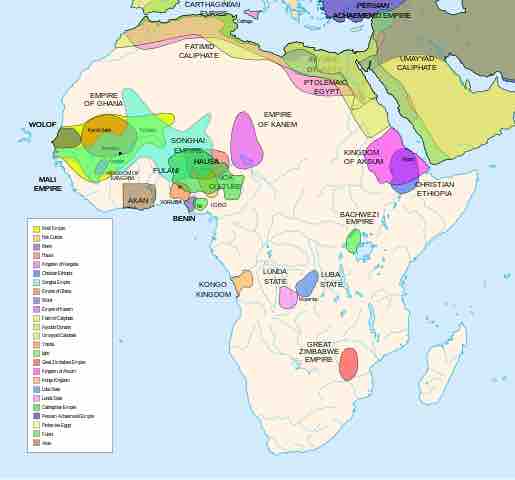Africa is considered to be the oldest inhabited territory on Earth, with the human species originating on the continent. During the middle of the twentieth century, anthropologists discovered many fossils and evidence of human occupation perhaps as early as seven million years ago. Fossil remains of several species of early hominids thought to have evolved into modern humans have been discovered.
Early Civilizations
Throughout humanity's prehistory, Africa had no nation states and was instead inhabited by groups of hunter-gatherers such as the Khoi and San. The domestication of cattle preceded agriculture. It is speculated that by 6000 BCE, cattle were already domesticated in North Africa. In 4000 BCE, climate change led to increasing desertification, which contributed to migrations of farming communities to the more tropical climate of West Africa.
By the first millennium BCE, ironworking had begun in Northern Africa and quickly spread across the Sahara into the northern parts of sub-Saharan Africa. By 500 BCE, metalworking was fully established in many areas of East and West Africa. Copper objects from Egypt, North Africa, Nubia and Ethiopia dating from around 500 BCE have been excavated in West Africa, suggesting that trans-Saharan trade networks had been established by this date.
At about 3300 BCE, the Pharaonic civilization of Ancient Egypt came to rise, lasting until 343 BCE. Egyptian influence reached deeply into modern Libya, north to Crete and Canaan, and south to the kingdoms of Aksum and Nubia.
European exploration of Africa began with Ancient Greeks and Romans. In 332 BCE, Alexander the Great founded Alexandria in Egypt, which would become the prosperous capital of the Ptolemaic dynasty after his death. Following the conquest of North Africa's Mediterranean coastline by the Roman Empire, the area was integrated economically and culturally into the Roman system. Christianity spread across the region at an early date.
In the early seventh century, the newly formed Arabian Islamic Caliphate expanded into Egypt and then into North Africa. Islamic North Africa became diverse and a hub for mystics, scholars, jurists and philosophers. Islam spread to sub-Saharan Africa, mainly through trade routes and migration.
Ninth to Eighteenth Centuries
Pre-colonial Africa possessed perhaps as many as 10,000 different states and polities characterized by many different sorts of political organization and rule. These included small family groups of hunter-gatherers, such as the San people of southern Africa; larger, more structured groups, such as the family clan groupings of the Bantu-speaking people of central and southern Africa; heavily structured clan groups in the Horn of Africa; the large Sahelian kingdoms; autonomous city-states and kingdoms such as those of the Akan; Edo people, Yoruba and Igbo people (also misspelled as Ibo) in West Africa; and the Swahili coastal trading towns of East Africa.
By the ninth century, a string of dynastic states, including the earliest Hausa states, stretched across the sub-Saharan savanna from the western regions to central Sudan. The most powerful of these states were Ghana, Gao, and the Kanem-Bornu Empire. Ghana declined in the eleventh century, and was succeeded by the Mali Empire which consolidated much of western Sudan in the thirteenth century. Kanem accepted Islam in the eleventh century.
In the forested regions of the West African coast, independent kingdoms such as the Nri Kingdom of the Igbo grew up with little influence from the Muslim north. The Ife, historically the first of the Yoruba city-states or kingdoms, established government under a priestly oba ('king' or 'ruler').
The Almoravids were a Berber dynasty from the Sahara that spread over a wide area of northwestern Africa and the Iberian peninsula during the eleventh century. The Banu Hilal and Banu Ma'qil were a collection of Arab Bedouin tribes from the Arabian Peninsula who migrated westwards via Egypt between the eleventh and thirteenth centuries. Following the breakup of Mali, the Songhai Empire was founded in the region of middle Niger and the western Sudan. Its leader Sonni Ali and his successor Askia Mohammad I (1493–1528) made Islam the official religion, built mosques, and brought to Gao Muslim scholars.
Slavery had long been practiced in Africa. Between the seventh and twentieth centuries, the Arab slave trade took 18 million slaves via the Trans-Saharan and Indian Ocean routes. Between the fifteenth and nineteenth centuries (500 years), the Atlantic slave trade took an estimated seven to twelve million slaves to the New World.

Ancient African Kingdoms and Empires
This map depicts a sample of the diverse cultures, kingdoms, and empires of pre-colonial Africa.